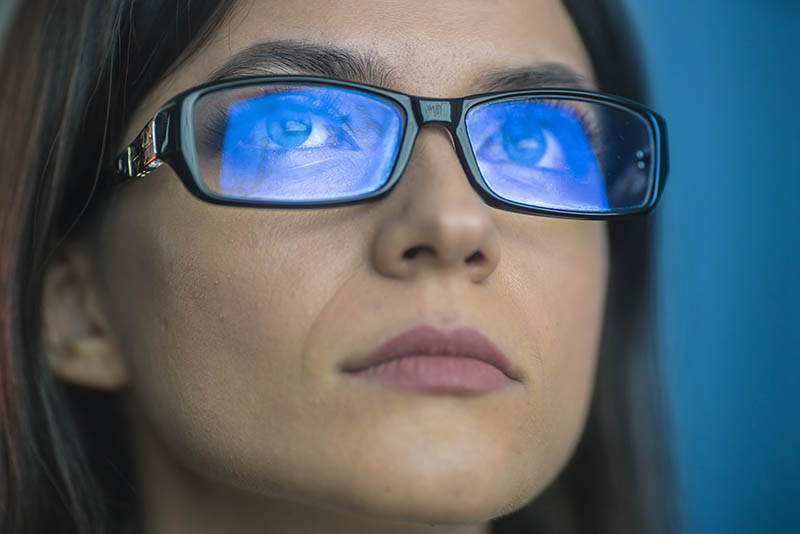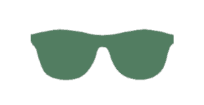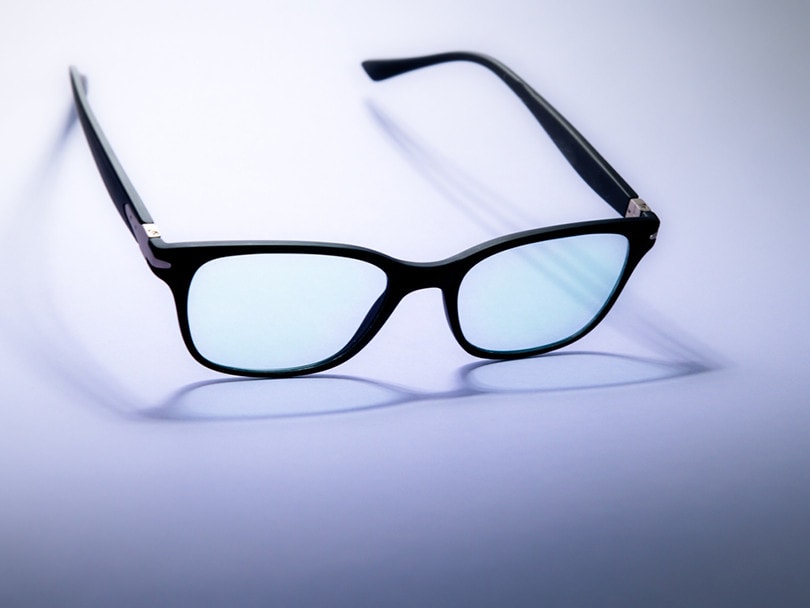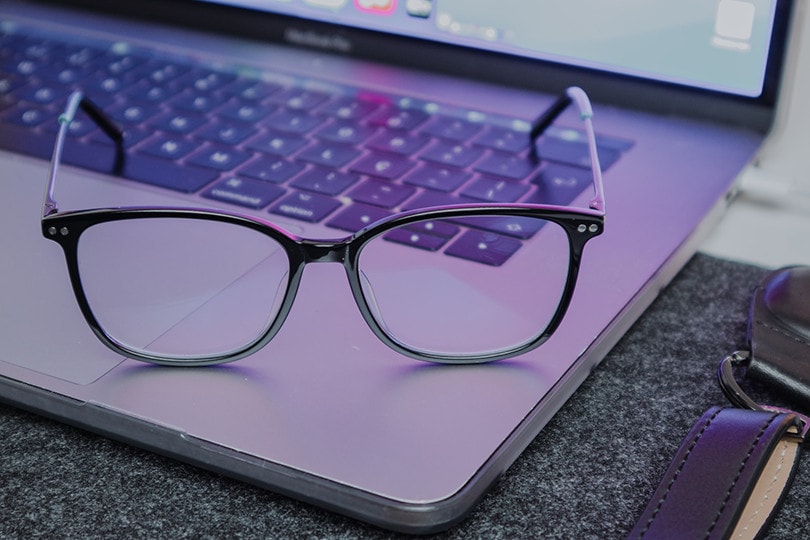Can You Get Blue Light Glasses with A Prescription?
Last Updated on

Blue light lenses are available for prescription and non-prescription glasses. What’s more, your vision insurance might even cover the blue light blocking coating for your glasses. But do blue light glasses actually work? Do you really need them?
In this article, we will present you with all the facts to help you make an informed decision.

What is Blue Light?
The sun showers a whole spectrum of light waves towards us every day. Light is a type of electromagnetic radiation, and although most energy waves are not visible to the human eye, the light waves that are visible have wavelengths that measure between 380 (violet light) and 700 nanometers (red light).
The longer the wavelength, the less energy the light wave has. At lengths measuring between 400 and 450 nm, blue light has one of the shortest wavelengths in the spectrum, which means it’s also very high in energy. The only visible light with a lower wavelength in the spectrum is violet light—any shorter, and we’re looking at ultraviolet light, which is very powerful and harmful to human health.
Computers, smartphones, tablets, TVs, and sunlight are all sources that emit blue light. Chances are, you spend a lot of time exposed to some or all of them, which is where blue light glasses come in.

Is Blue Light Harmful?
According to some alarmist headlines, blue light contributes to macular degeneration—an eye condition that damages the macula of the eye, and sometimes leads to vision loss.
However, reputable sources argue that blue light from digital screens will not damage any part of your eye.
But if you work with computers, you may be wondering what causes the gritty, sore feeling in your eyes after a few hours of staring into the screen, if it’s not blue light.
The answer is Digital Eye Strain, and there are ways to prevent it.
Digital Eye Strain
Digital eye strain happens when we spend too long staring into a bright digital screen, such as a computer screen or smartphone.
Studies show that we tend to blink less when we are looking at a digital screen, which often leads to dry eyes. Simply making a conscious effort to blink more when using a screen could help to alleviate some of the discomforts.
Another solution is to follow the “20-20-20” rule. After 20 minutes at the screen, shift your gaze to a spot that’s at least 20 feet away, and hold it there for 20 seconds. This will reduce the amount of strain you put on your eyes by staring at a near object for a long period of time.

Blue Light Disrupts Circadian Rhythm
Just because blue light doesn’t contribute to eye strain, and doesn’t lead to vision loss, does not mean that it’s entirely harmless.
If you’ve ever found yourself lying in bed staring up into the ceiling wide-eyed when you know you should be sleeping, blue light could be the potential cause.
All types of light suppress the secretion of melatonin, a type of sleep hormone. Production of melatonin usually increases as the sun sets and the sky darkens, to help prepare you for sleep. Studies show that blue light effectively suppresses melatonin production. In fact, exposure to blue light can suppress the sleep hormone for up to twice the length of green light.
For those who work in the evenings and at night, it may be beneficial to wear blue light blocking glasses to help prevent insomnia.
Do Blue Light Blocking Glasses Really Work?
The question of whether blue light blocking glasses really work depends on what you’re hoping to achieve with them. It’s important to remember that we get significantly more blue light from regular sunlight than we do from screens.
If you are looking to reduce digital eye strain, chances are that blue light glasses will do nothing for you. Regular breaks, blinking more, and reducing glare by using dark mode are all cheaper, more effective ways of avoiding digital eye strain.
If you are looking to get a better night’s sleep, they may be worth a try. Some studies conclude that blue light blocking glasses help with getting a better night’s sleep. However, as blue light coating is not standardized, there’s no guarantee that the pair you end up choosing will work.
In fact, preventative methods such as avoiding bright lights and screens at night may work better overall.

Does Insurance Cover Blue Light Glasses?
Some vision insurance may cover blue light coating for your prescription glasses. You should always check with your vision insurance and seek medical advice if you are experiencing symptoms of eye strain or insomnia. Medical professionals may advise you to take preventative steps that are both cheaper, and more likely to work than blue light glasses.
Can You Add Blue Light Coating to Existing Lenses?
You may be able to get an anti-reflective coating with blue light blocker put onto your existing lenses, but only if the lenses are still in good condition. The best way to be certain is to visit your optician. They may choose to prescribe pigmented lenses that filter blue light instead.
Can You Wear Blue Light Glasses All Day?
You can wear blue light glasses all day, and they won’t have adverse effects on your vision. However, if you are expecting them to help you with an aspect of your vision, it’s better to speak to an eye care specialist about whether they are the best solution for you.

Summing Up
It is possible to get blue light glasses with your prescription, however, there is no conclusive evidence that shows blue light blocking glasses are beneficial. Some people believe that blocking out blue light from digital screens will preserve their eyesight, but the scientific community remains skeptical.
Meanwhile, as blue light from devices used at night can interfere with sleep patterns, blocking them out—either with special glasses, or by stepping away from the devices—could help improve your overall health!
Featured Image Credit By: Realstock, Shutterstock
About the Author Cheryl Regan
Cheryl is a freelance content and copywriter from the United Kingdom. Her interests include hiking and amateur astronomy but focuses her writing on gardening and photography. If she isn't writing she can be found curled up with a coffee and her pet cat.
Related Articles:
Can You Use Binoculars to Look At Stars? How to Choose the Right Pair
How to Clean a Refractor Telescope: Step-by-Step Guide
How to Clean a Telescope Eyepiece: Step-by-Step Guide
How to Clean a Rifle Scope: 8 Expert Tips
Monocular vs Telescope: Differences Explained (With Pictures)
What Is a Monocular Used For? 8 Common Functions
How to Clean a Telescope Mirror: 8 Expert Tips
Brightfield vs Phase Contrast Microscopy: The Differences Explained
